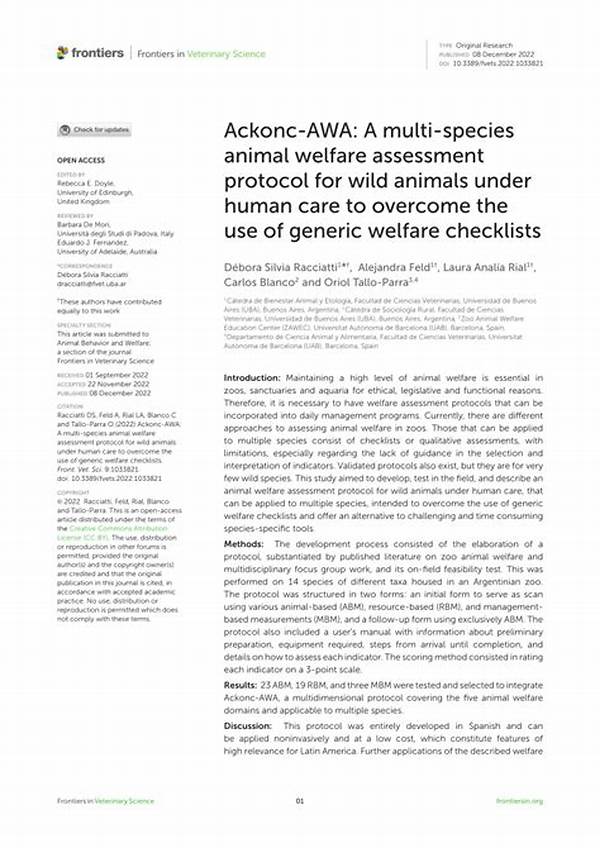Hello there, fellow animal lovers and curious minds! Today, we’re diving deep into a topic that intertwines science, compassion, and a sprinkle of ethical dilemmas—animal welfare in research protocols. It’s a subject that warrants attention as it touches on how we conduct scientific exploration while ensuring our furry, scaly, and feathered friends are well taken care of. Whether you’re a scientist, a student, or just someone who cares about the well-being of animals, let’s navigate this together, shall we?
Read Now : Free Watermark Creators For Images
Why Animal Welfare Matters in Research
Let’s face it, science and research are integral to our understanding of the world. Whether it’s developing a life-saving medication or figuring out a cosmic enigma, research is key. However, as much as we love breakthroughs, the welfare of animals used in research protocols is critical. These animals are the unsung heroes behind many scientific advances, and ensuring they are treated humanely helps us maintain ethical standards and improve public trust in science. Animal welfare in research protocols is about ensuring these creatures experience as little discomfort as possible—kind of like making sure our pets feel comfy during a veterinarian visit. It’s not just about ticking off a checklist but genuinely fostering a culture of empathy and responsibility.
Moreover, animal welfare in research protocols plays a significant role in the quality of scientific data. Happy and healthy animals yield more reliable results, free from the stresses that could skew data. So, what’s the game plan? Research labs across the globe are adopting the 3Rs principle—Replacement, Reduction, and Refinement—to guide them. This means they are constantly looking for alternatives (Replacement) to animal testing, using fewer animals where possible (Reduction), and refining procedures to minimize discomfort (Refinement).
By championing animal welfare in research protocols, we’re not only doing right by our animal friends but also ensuring that scientific discoveries are built on robust and ethical foundations.
Key Principles of Animal Welfare in Research
1. Replacement: Always consider non-animal alternatives first. It’s not just ethical; it often saves costs too.
2. Reduction: Use the fewest animals necessary to get valid results. Think smarter, not larger.
3. Refinement: Constantly tweak procedures to enhance animal comfort and minimize pain.
4. Training: Ensure all personnel involved are trained in animal welfare laws and protocols. Knowledge is power, after all.
5. Oversight: Regular audits and peer reviews can keep everyone honest and procedures transparent.
Implementing Strategies for Animal Welfare
Animal welfare in research protocols isn’t simply about following a set of rules; it’s an ongoing effort. Regular training sessions and updates are essential. Scientists need to stay informed about new methods that might improve animal conditions. It’s also vital to maintain open communication channels within research teams, which fosters a culture of empathy and responsibility. This way, everyone is on the same page regarding the care and ethical treatment of research animals.
Additionally, collaborating with veterinarians during study planning is another strategy worth noting. They offer invaluable insights into animal physiology and behavior, ensuring the most humane practices are incorporated. It’s all about fostering a team culture where animal welfare in research protocols is part of the fabric of scientific inquiry.
Read Now : Ideal Iso Levels For Outdoor Portraits
The Role of Ethics Committees
Ethics committees are the gatekeepers of animal welfare in research protocols. They review every proposed study to ensure it meets ethical standards, including proper animal care. Every project undergoes a rigorous approval process, with committees acting as vigilant overseerés. Their role doesn’t stop at approval—they conduct follow-up inspections to ensure compliance throughout the research. It might sound like a lot of red tape, but these steps are crucial.
Another aspect ethics committees focus on is ensuring transparency with the public. They provide summaries of how animals will be used and cared for, ensuring accountability and maintaining public trust. Animal welfare in research protocols is not just a checkbox on a form; it’s an ongoing commitment to ethical scientific practice.
Challenges in Maintaining Animal Welfare Standards
Maintaining animal welfare in research protocols isn’t without its hurdles. One major challenge is balancing scientific needs with ethical responsibilities. At times, the quest for data might appear at odds with minimizing animal use, making it crucial to navigate these waters with care.
Funding can also play a significant role in how well animal welfare standards are maintained. Limited resources might lead to corners being cut, highlighting the need for proper budget allocation to ensure ethical practices aren’t compromised. Research institutions must prioritize funds for animal welfare as much as they do for research itself.
On the flip side, technological advancements provide hope. With innovations like computer simulations and advanced cell cultures, the dependency on live animals can be reduced, tipping the scale toward ethical research practices. It’s about leveraging technology to enhance animal welfare in research protocols while achieving scientific goals.
Slang Corner: ‘Keeping It Real with Animal Welfare’
Okay, let’s spill some tea on animal welfare in research protocols. It’s all about keeping it real for our furry pals in the lab, ya know? Imagine being a lab rat—nobody wants unnecessary stress cramping their tails. So, scientists gotta be all up-to-date with the latest humane techniques and tech to keep those vibes positive. And let’s not forget, ethics committees are like the hype squad, making sure everything’s on the up and up before experiments even get the green light. So, when you hear about animal welfare in research, it’s really about scientists being the MVPs in the game of empathy and innovation. Keep it chill and ethical, folks!
A Quick Recap on Animal Welfare in Research Protocols
In summary, animal welfare in research protocols is about striking the right balance between scientific advancement and ethical responsibility. The principles of Replacement, Reduction, and Refinement guide the process, ensuring animal well-being is prioritized. Research teams, armed with proper training and guided by ethics committees, navigate this delicate balance—working tirelessly to make sure animals experience minimal stress during research.
Remember, while challenges exist, technological advancements bring promising alternatives to traditional methods, reducing reliance on animals and enhancing their welfare. It’s a collective effort involving scientists, ethics committees, and the broader public to maintain trust in scientific endeavors. In the end, embracing animal welfare in research protocols not only makes us better scientists but also better stewards of the animals we share our world with.



